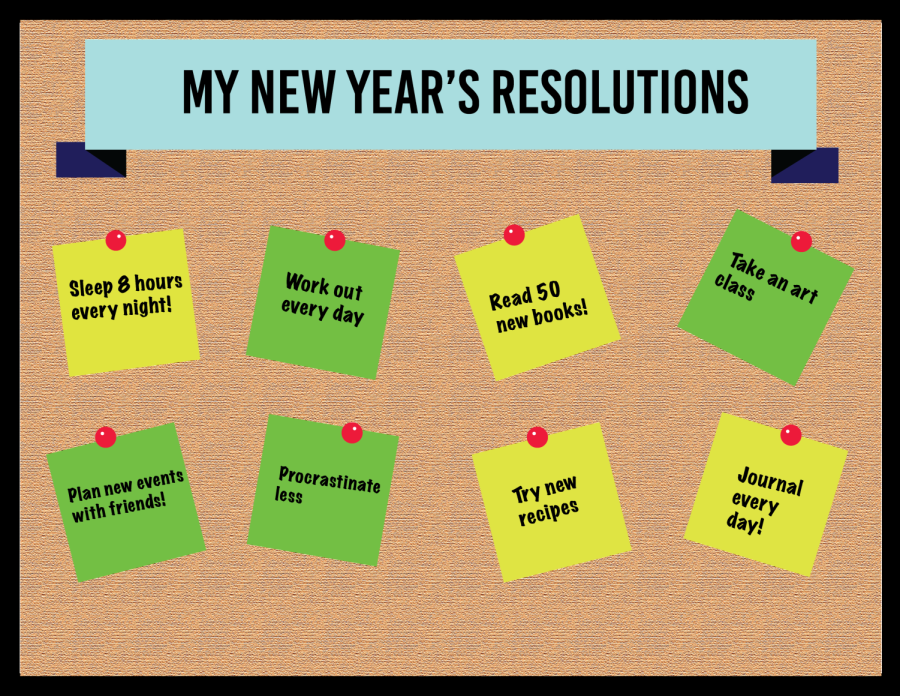Two months into the New Year, students agree: the smaller the resolution, the better
Between going to class, doing homework, holding part-time jobs, staying active in campus clubs, doing research and being on co-op, students have little time left to dedicate to popular resolutions. However, a few Northeastern students have found success in goal-making this year.
February 27, 2023
As it is widely known, New Year’s resolutions have a short shelf life. Strava dubbed Jan. 13 National Quitter’s Day — it is when most people abandon their annual promises. However, a few Northeastern students have found success in goal-making this year.
For 2023, a Forbes Health/OnePoll survey found that the most popular New Year’s resolutions are: improving mental health (45%), improving fitness (39%) and losing weight (37%).
Making lifestyle changes like these are difficult for anyone, but especially college students with various time-consuming responsibilities. Between going to class, doing homework, holding part-time jobs, staying active in campus clubs, doing research and being on co-op, students have little time left to dedicate to popular resolutions. How can these barriers to resolution success be overcome?
Alexia Huerta, a third-year health science major, has sworn off New Year’s resolutions because they can be “self-depreciative” and “time consuming.”
“If I say to myself, ‘I need to go to the gym today,’ a good portion of my mind is like, ‘Where am I going to find time to work out?’ instead of focusing on what I actually need to get done, like homework,” Huerta said. “If I can’t go to the gym then that’s fine, but if it were my New Year’s resolution, I would probably think a little bit more negatively about myself for not going.”
Huerta is not alone when it comes to abandoning resolutions — Forbes stated that 80% of New Year’s resolutions fail by the beginning of February. The reasons why people are consistently unsuccessful with their resolutions are nuanced, but for many, it is because making big lifestyle changes overnight is not easy.
As a STEM student, Huerta said she budgets much of her time for homework and can’t add an annual lifestyle change to her plate. Additionally, she thinks it is “silly” for people to adjust their behaviors just because it is the start of a new year.
“If I’m going to do something, it shouldn’t just be because it’s the beginning of the year, I should have been doing it once before and am just continuing on,” Huerta said.
Lyndsey Toce, a fourth-year business administration major, has kept her resolution to do morning yoga twice each week. Toce picked up the hobby while on co-op in fall 2022 and found it helped her mood, so she vowed to continue practicing yoga regularly in 2023.
Like Toce, Robert Neumann, a fourth-year health science and business administration combined major, has been successful in his resolution to wear nice clothes to class every day to boost self esteem and productivity. Neumann said sticking to his lifestyle change has required him to plan ahead the night before each day on campus, which has been his biggest hurdle to success, but worthwhile nonetheless.
“I feel a lot more confident and am a lot more productive when I dress to impress as opposed to being comfortable,” Neumann said.
Despite the challenges that come with lifestyle changes, Toce and Neumann agree that New Year’s resolutions can be useful if done realistically.
Likewise, Zoe Farkash, a second-year behavioral neuroscience major on the pre-med track, believes in setting smaller, less quantitative goals. Rather than committing to going to the gym seven days a week, people should vow to get more movement in, Farkash shared as an example.
“Resolutions don’t have to be all or nothing, they can just be something to work toward and even if you don’t completely finish them you’ve tried and that’s better than nothing,” Farkash said. “Like, going to the gym for 20 minutes even though you don’t want to is better than not going at all.”
Echoing Farkash’s idea to set low pressure goals, Toce said she learned in her Managing Organizational Change and Disruption course that it can be helpful to make goals smaller so they are more manageable to achieve.
“The smaller the resolution, the more willing you are to do it,” Toce said. “It can actually end up that you over-accomplish or overachieve your goals and you keep adding on to them, so instead of starting with a really big goal you’re actually ending with a bigger goal than you wanted.”


















